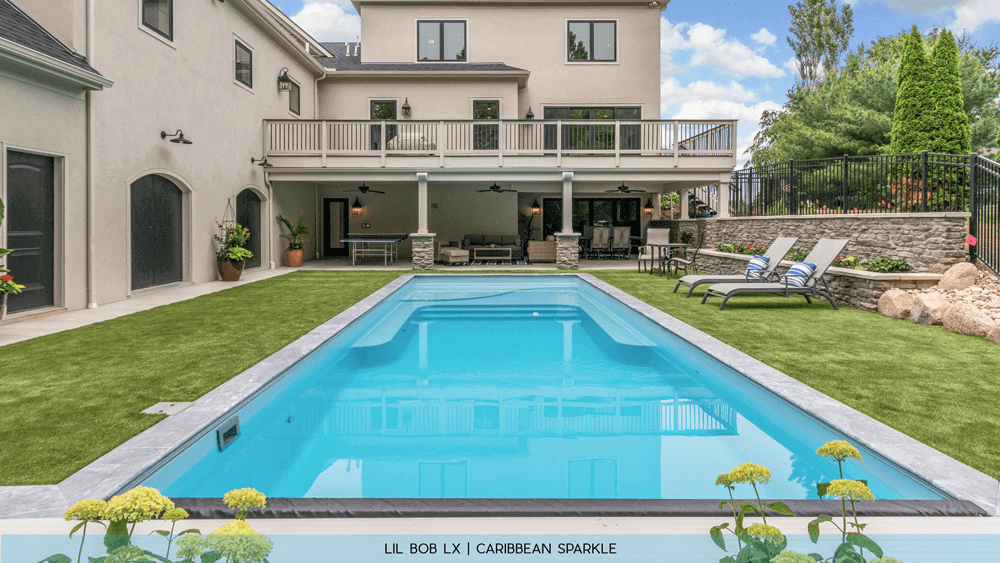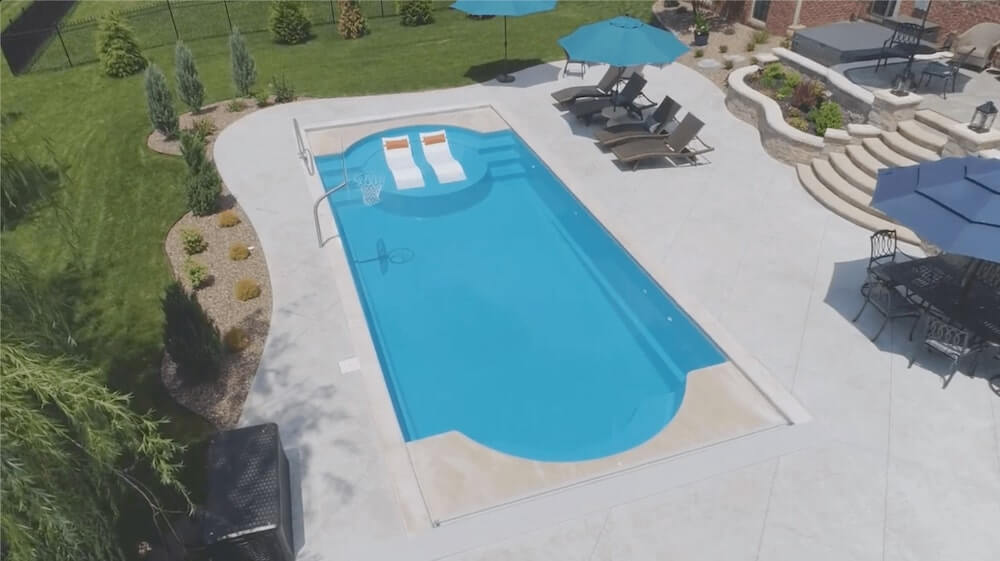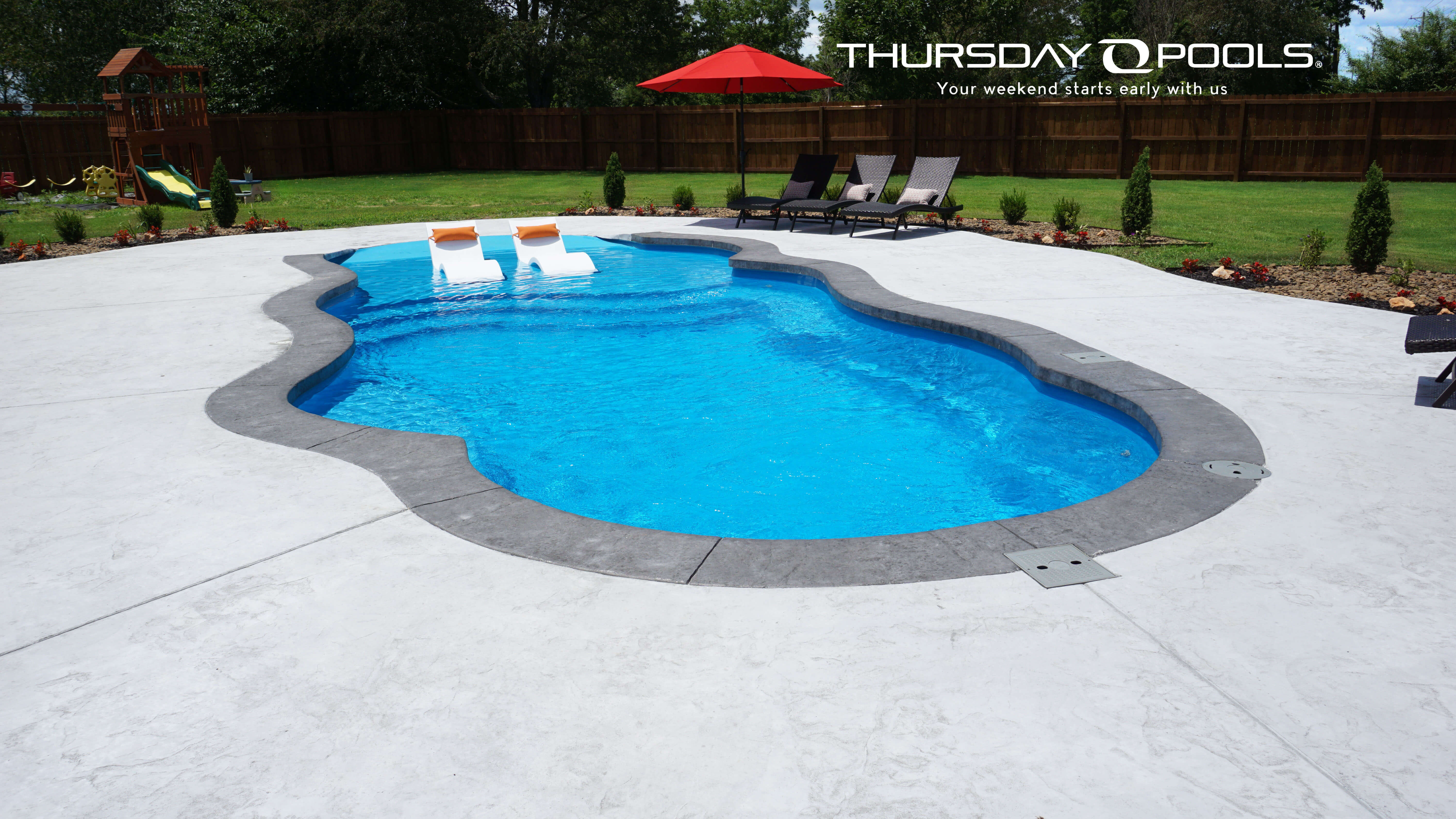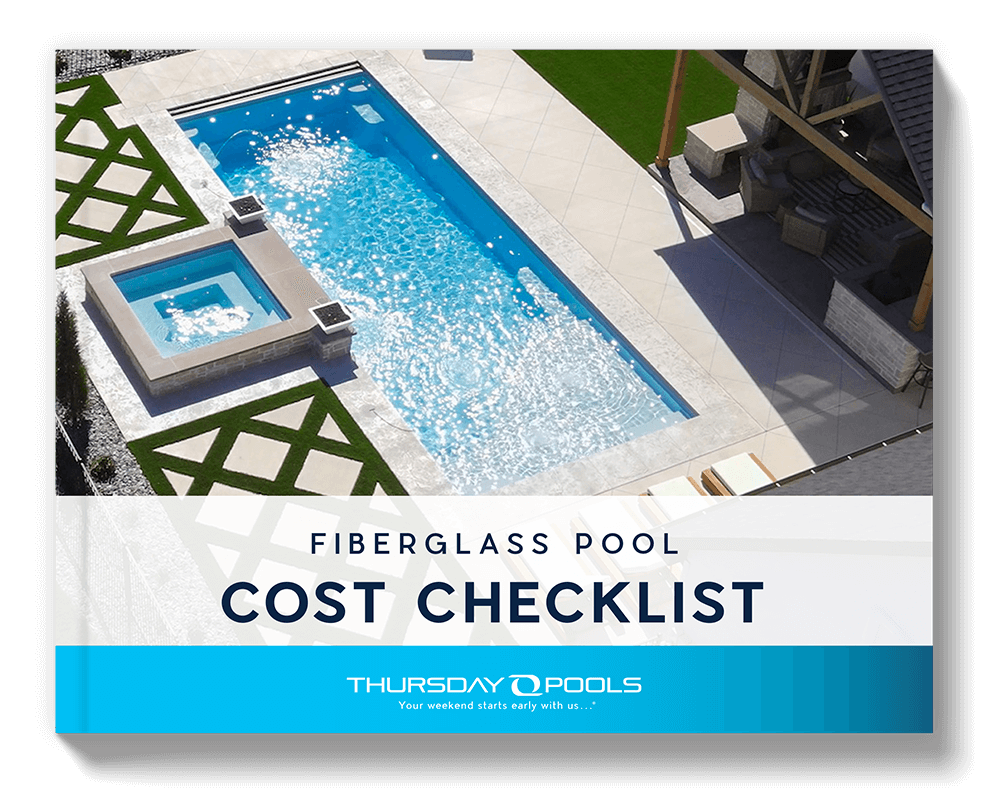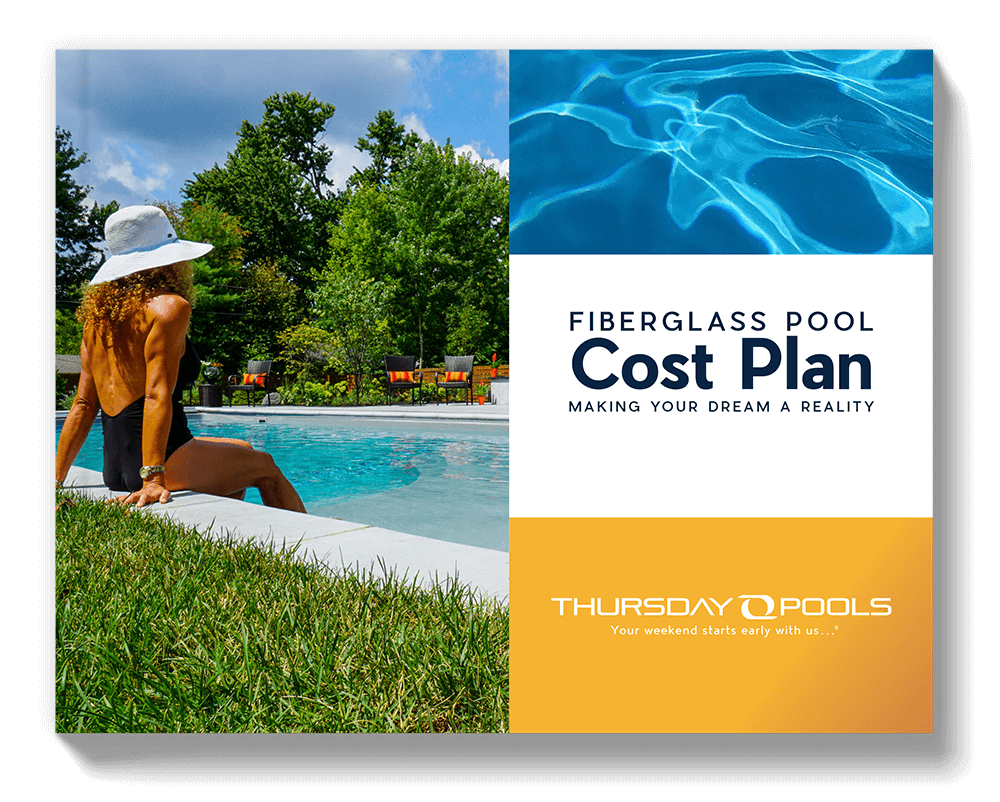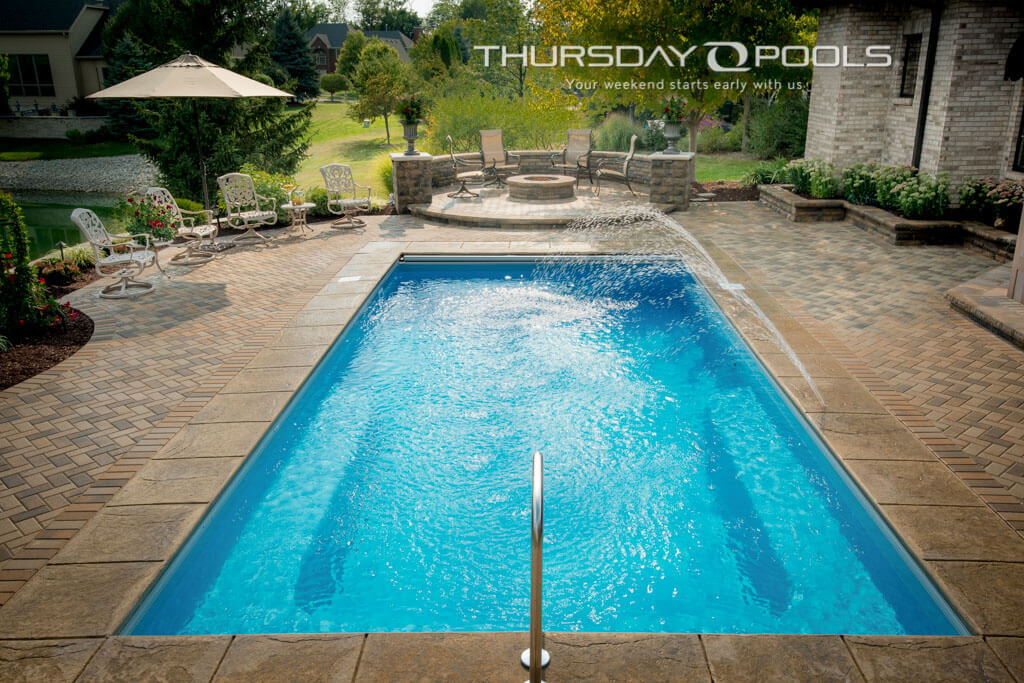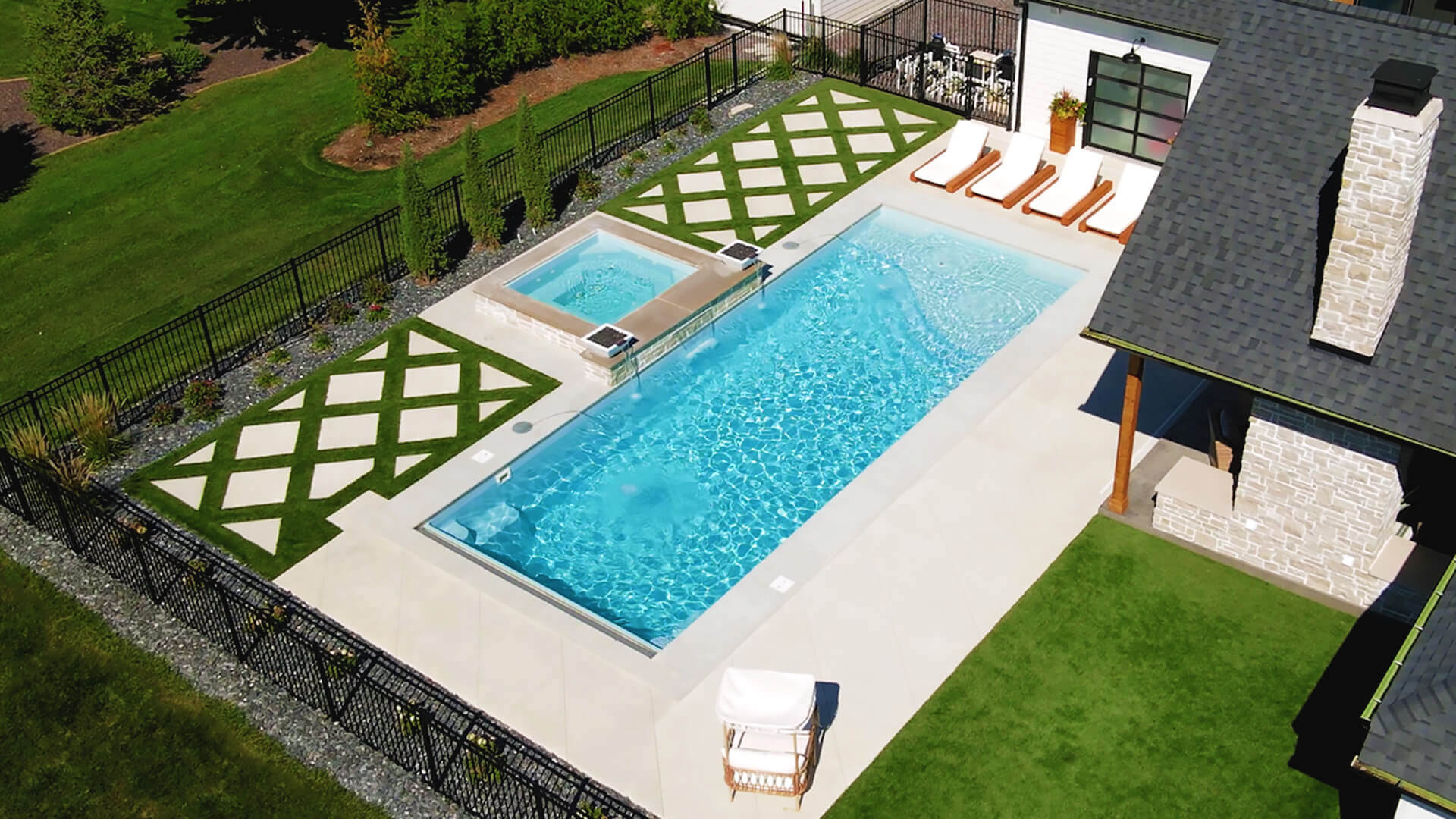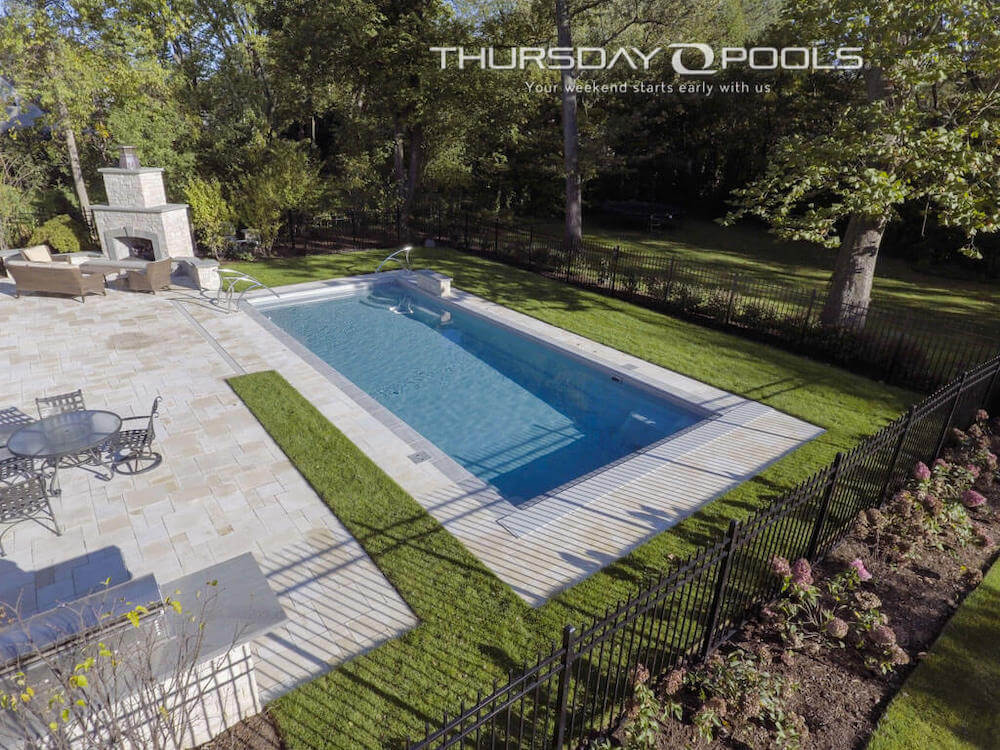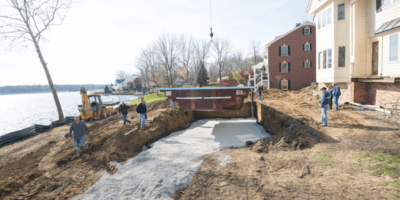Topic: Cost
Everything You Need to Know About Fiberglass Pools
How Much Does a Fiberglass Pool Cost in Georgia?
From the rolling hills of North Georgia to the coastal plains along the Atlantic, the Peach State offers a rich blend of natural beauty and southern charm. With long, hot summers and mild winters, Georgia’s climate makes it an ideal place to enjoy a backyard pool nearly year-round. If you’re dreaming of turning your outdoor space into a personal retreat, understanding fiberglass pool cost in Georgia is an essential first step. Whether you’re in the vibrant metro area of Atlanta or nestled in a quieter corner like Savannah or Athens, your location, soil conditions, water table levels, and even local tree coverage can all influence the overall price of your pool installation.
Bringing your dream pool to life means more than just digging a hole—it’s about crafting an experience tailored to your needs and lifestyle. Every choice affects your final cost, from integrated spas and elegant water features to decking materials and landscape design. Georgia homeowners also need to consider permitting, zoning, and sometimes HOA approvals, which can add layers to the planning process. That’s why partnering with a trusted, local fiberglass pool installer who understands the regional nuances is the best way to ensure your project flows smoothly from start to swim.
Peach State Pool Pricing: What to Expect for the Average Fiberglass Pool Cost in Georgia
To help you better understand what bringing a fiberglass pool to your Georgia backyard might cost, Thursday Pools gathered fresh insights from our network of independent dealers throughout the state in a 2025 survey. Whether you’re planning a serene poolside escape in the suburbs of Atlanta or envisioning a quiet retreat in the rolling countryside near Macon or Augusta, knowing the average installation cost is a smart starting point.
AVERAGE GEORGIA FIBERGLASS POOL INSTALLATION BY SIZE |
|||
|---|---|---|---|
| Pool Type | Small Fiberglass Pools | Medium Fiberglass Pools | Large Fiberglass Pools |
| Size Range | Up to 26 ft Long or 400 ft² | 26 to 34 ft Long or 400 to 600 ft² | 35 ft and Longer or 600+ ft² |
| Average Cost | $60,000 | $100,000 | $120,000 |
Georgia’s diverse landscape—from red clay in the north to sandy soils near the coast—the cost of excavation and site prep can vary significantly depending on where you live. Add personalized features like integrated spas, stylish water features, or custom stone decking; your total investment can shift accordingly. While these average figures offer a solid foundation for planning, the best way to get a true estimate is to connect with a knowledgeable, Georgia-based Thursday Pools dealer who understands the local conditions and can tailor a quote to your specific site and vision.
Average Pricing for Georgia’s Top Fiberglass Pool Picks
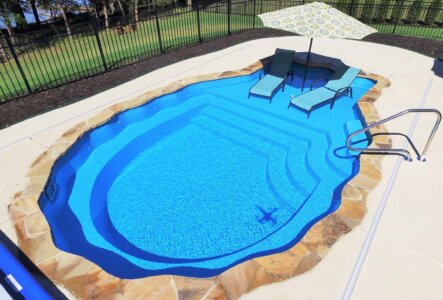
PERAL (15’ x 25’)
The Pearl is a fantastic choice for Georgia homeowners looking for a compact yet elegant fiberglass pool. At 15′ in width and 25’ in length, it’s perfect for mid-sized backyards in cities like Atlanta, Marietta, or Augusta. The pool features a spacious tanning ledge and built-in wrap-around benches, making it ideal for lounging and socializing. Its sleek, non-skid surfaces ensure comfort and safety for all swimmers.
Based on insights from our 2025 survey of Thursday Pools dealers in Georgia, the average cost for a standard Pearl installation is around $60,000. Of course, fees may vary depending on site preparation, location, and any additional customization like landscaping or spa features.
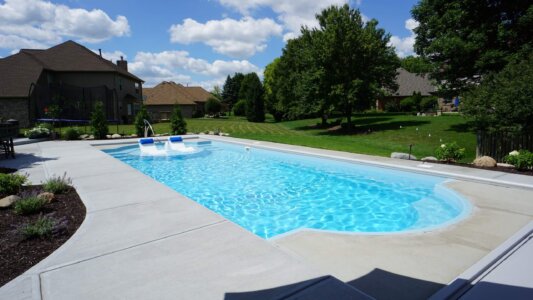
CATHEDRAL (14’ x 33’)
The Cathedral is an ideal fiberglass pool for Georgia homeowners seeking space and versatility. Its expansive rectangular shape offers plenty of room for swimming, exercise, or family fun, making it perfect for homes in areas like Atlanta, Peachtree City, or Albany. The Cathedral features dual corner entry steps and integrated benches, providing a relaxing spot to unwind after enjoying the Georgia sunshine.
According to our survey results, the typical cost for a standard installation of the Cathedral and similar medium-sized pools between 26 and 34 feet in length or 400 to 600 square feet is around $100,000.
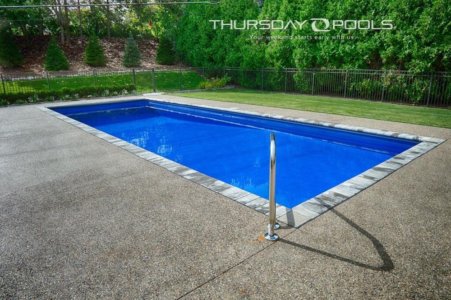
MONOLITH (16’ x 40’)
The Monolith offers a striking, full-sized fiberglass pool that combines luxury with practicality for Georgia homeowners with more room to work with. Measuring 40 feet in length, the expansive Monolith is ideal for those who want ample space for swimming laps, hosting poolside gatherings, or simply enjoying the outdoors. The Monolith is perfect for active use and relaxation, featuring a full-length swim lane, built-in tanning ledge, and dual-end benches.
The Monolith is well-suited for larger properties in areas like Johns Creek, Alpharetta, or rural Georgia, where space is abundant. The average cost for a standard installation of the Monolith and similar 40-foot fiberglass pools in Georgia is approximately $120,000.
Evaluating Your Georgia Property for Fiberglass Pool Installation
Georgia’s varied landscape can affect the cost and process of fiberglass pool installation. In regions like the North Georgia mountains, rocky or uneven terrain may require extra excavation and equipment, raising costs. Flatter areas like the Piedmont or coastal plains might present fewer digging challenges but could require special clay or sandy soil treatments.
The layout of your property is also important. Sloped yards, common in areas like Blue Ridge or suburban homes in cities like Lawrenceville, may require additional grading. In urban areas like Atlanta, narrow streets or gated communities might necessitate cranes for pool shell installation.
Partnering with a local pool expert can help navigate Georgia’s unique challenges, ensuring a smooth and cost-effective installation.
| AVERAGE ADDITIONAL YARD-RELATED EXPENSES IN GEORGIA
|
|
| Excavating Rocky Soil | $5,000 |
| Above-Average Slope Requiring Extra Grading | $5,000 |
| Limited Yard Access | $8,000 |
Understanding Pool Barrier Safety Requirements in Georgia
Pool safety is essential for preventing accidents and restricting unauthorized access, particularly for young children, pets, and other vulnerable individuals. Georgia’s state regulations mandate that residential pools be enclosed by a barrier at least 4 feet high. The barrier must also feature a self-closing and self-latching gate to prevent young children from accessing the pool area without adult supervision. In addition to gate requirements, installers must build the barrier to prevent small children from squeezing through, with gaps between the fence slats not exceeding 4 inches.
While state guidelines set the minimum standards, local municipalities in Georgia may enforce stricter regulations. These can include requirements for taller fences, specific types of fencing materials, or enhanced security features such as additional locks or alarms. To ensure your pool meets state and local safety requirements, check with your local building department or homeowners association for additional codes that may apply in your area.
Before installing a pool, consulting with a local pool professional is highly recommended. They can help guide you through the permitting process and ensure your pool complies with all safety regulations, offering legal peace of mind and enhanced safety for your family and guests.
For a 300-linear-foot fence, Georgia homeowners can expect to pay an average of $8,000 according to estimates from our area dealers.
Enhance Your Georgia Backyard with Pool Add-Ons
Create a custom retreat in your Georgia backyard by adding popular fiberglass pool enhancements. These upgrades boost visual appeal and increase comfort, convenience, and safety. Below, we’ve organized some of the top add-ons chosen by Georgia homeowners, along with average cost estimates from our 2025 survey of Thursday Pools’ independent dealers across the state.
Pool Safety & Barrier Enhancements
Automatic Pool Cover Average Cost in Georgia: $16,000
Enhance safety and convenience with an automatic pool cover that operates at the touch of a button. It helps minimize water evaporation, removes debris, and adds extra protection, especially for families with kids or pets.
Manual Safety Pool Cover Average Cost in Georgia: $5,000
A cost-effective solution for maintaining a clean and secure pool. This durable cover helps prevent unwanted access while keeping leaves, dirt, and other debris out of the water.
Pool Heating & Maintenance Systems
Pool Heater Average Cost in Georgia: $9,000
Keep your pool water at the perfect temperature year-round, even as Georgia nights get colder, and extend your swimming season.
UV Filtration System Average Cost in Georgia: $2,000
Reduce the need for harsh chemicals and enjoy sparkling, clear water with a UV filtration system that effectively neutralizes bacteria and algae.
Automatic Pool Cleaner and Vacuum System Average Cost in Georgia: $1,500
Save time and effort with an automatic cleaning system that keeps your pool pristine and ready for a swim with minimal maintenance.
Pool Automation and Smart Control System Average Cost in Georgia: $8,000
Enjoy ultimate convenience by controlling your pool’s temperature, filtration, and lighting from your smartphone or tablet, offering easy access to pool management from anywhere.
Pool Decking & Landscaping
Concrete Patio (Approx. 1,200 sq. ft.) Average Cost in Georgia: $15,000
A sturdy, cost-effective choice that handles Georgia’s climate well and provides a clean, reliable poolside surface.
Paver Patio (Approx. 1,200 sq. ft.) Average Cost in Georgia: $16,000
Pavers offer a stylish, slip-resistant finish with options like concrete, brick, or natural stone—perfect for customizing your backyard look.
Landscaping Average Cost in Georgia: $15,000
Enhance your pool area with simple landscaping touches like shrubs, flowers, or decorative borders to boost curb appeal.
Water Features & Stylish Accents
Specialty Waterline Tile Average Cost in Georgia: $2,500
Give your pool a custom, high-end finish with decorative waterline tile. This eye-catching detail adds color, texture, and a polished look that elevates your entire poolscape.
LED Pool Lights Average Cost in Georgia: $1,000 per light
Set the mood after sunset with LED pool lights. Choose from crisp white or vibrant color-changing options to create the perfect evening atmosphere, all while keeping energy costs low.
Deck Jets Average Cost in Georgia: $500 per jet
Add a dynamic visual element with deck jets that send graceful streams of water arching into the pool.
Bubblers Average Cost in Georgia: $500 per bubbler
For tanning ledges or shallow areas, bubblers produce gentle, bubbling water effects that are playful and soothing, adding life and motion to your pool.
Cascading Waterfalls Average Cost in Georgia: $5,000
Bring the calming sounds of nature to your backyard with a built-in waterfall feature. Add a spa-like ambiance and enhance the overall aesthetic of your pool.
Add-On Spa Average Cost in Georgia: $16,000
Take your relaxation to the next level with an attached spa. Whether for hydrotherapy or a peaceful retreat, a spa addition offers a stunning spillover effect into the main pool.
Pool Slides and Diving Features
Simple Pool Slide Average Cost in Georgia: $5,000
Bring a playful element to your pool with a traditional slide—simple, fun, and great for family enjoyment.
Deluxe Pool Slide Average Cost in Georgia: $15,000
For a more adventurous experience, a deluxe slide offers extra height and curves for added excitement.
Diving Board (Type 1 Diving Pools Only) Average Cost in Georgia: $1,000
Diving boards are only permitted for certified Type 1 diving pools that meet specific depth and slope standards. Proper planning and installation are essential for safe use.
Due to safety concerns, Thursday Pools strongly discourages slides and diving boards. Not all fiberglass pool models support these features. If you’re considering adding one, it’s crucial to consult a licensed professional to ensure compliance with local codes, safety regulations, and manufacturer specifications. Homeowners and installers share responsibility for safe installation and use. Always prioritize safety and expert guidance before adding diving or sliding elements to your pool.
Bring Resort-Style Living Home with a Georgia Fiberglass Pool
A fiberglass pool in Georgia is more than just a home upgrade—it’s a gateway to year-round relaxation, quality family time, and elevated outdoor living. Whether you’re embracing the coastal charm of Savannah, the energy of Atlanta’s suburbs, or the scenic beauty of North Georgia, a well-designed pool can transform your backyard into a personal retreat and add long-term value to your home.
Georgia’s varied landscape brings unique design opportunities and challenges from wooded lots to wide-open spaces. That’s why working with a trusted local Thursday Pools dealer is essential. Your dealer will assess everything from terrain and soil conditions to climate and layout, ensuring your pool design fits seamlessly with your property and lifestyle.
Ready to bring your vision to life? Explore pricing with the Thursday Pools Pool Cost Calculator, discover your perfect fit using the Pool Selector Tool, and connect with a Georgia dealer to start planning your custom backyard escape today.
Get Your Personalized Estimate
Pool Cost Checklist
The Cost Plan eBook
How Much Does an Inground Pool Cost?
How Much Does a Fiberglass Pool Cost in Texas?
Everything’s bigger in Texas—including the possibilities for your backyard pool. With long summers and mild shoulder seasons, Texans get more swim days than most—which makes a pool less of a luxury and more of a lifestyle staple. If you’re exploring fiberglass pool cost in Texas, knowing how location, landscape, and lifestyle shape your final investment is essential. From the rocky terrain of the Hill Country to the clay-heavy soils of East Texas, excavation and site prep needs can vary widely across the state. In cities like Austin, Dallas, and Houston, tighter lot sizes or overhead obstructions may require specialized equipment, while homeowners in areas like Waco, Midland, or the Gulf Coast often enjoy more open space and layout flexibility.
Personalizations like smart automation, deck jets, a spillover spa, or custom premium decking help make the most of homeowners’ outdoor space, but the add-ons also add to the total pool cost. Each Texas municipality may have unique pool permitting rules, fencing laws, or HOA guidelines that can affect your timeline and budget. There is a lot to cost-compare, plan, and think about. Partnering with an experienced local fiberglass pool professional will help you navigate the details and design a pool that brings beauty, functionality, and lasting value to your Texas home.
What is the Average Cost of a Texas Fiberglass Pool Installation? Survey Says…
Through a 2025 survey of our independent dealers across Texas, Thursday Pools has gathered valuable data to help you estimate the average cost of installing a fiberglass pool in the Lone Star State. If you’re just starting your research into fiberglass pool costs in your area, you’re in the right place.
AVERAGE TEXAS FIBERGLASS POOL INSTALLATION BY SIZE |
|||
|---|---|---|---|
| Pool Type | Small Fiberglass Pools | Medium Fiberglass Pools | Large Fiberglass Pools |
| Size Range | Up to 26 ft Long or 400 ft² | 26 to 34 ft Long or 400 to 600 ft² | 35 ft and Longer or 600+ ft² |
| Average Cost | $70,000 | $100,000 | $120,000 |
While this data provides a great starting point, remember—every backyard is different. Soil conditions, access, layout, and desired pool features each influence your final price. For the most precise picture of what your dream pool might cost, reach out to a trusted Thursday Pools dealer in your area.
Average Cost of Popular Pool Models Installed in Texas
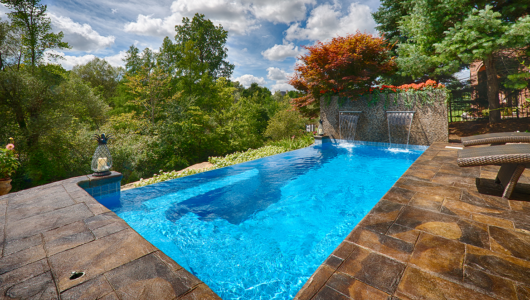
SEA TURTLE (9.5’ x 19.5’)
The Sea Turtle is a compact powerhouse for Texas homeowners with smaller spaces or an eye for efficiency. At just less than 20 feet long, this small fiberglass pool fits perfectly into urban lots in places like Austin or Plano without compromising on style or comfort. It includes wide entry steps and built-in benches inviting conversation and cooling off—ideal for unwinding after a long day or providing younger swimmers a safe space to splash. The Sea Turtle’s flat-bottom design makes it a versatile choice for exercise and fun, proving that good things come in smaller footprints.
According to our 2025 survey of Thursday Pools dealers in Texas, the average cost for a standard installation of a Sea Turtle or similar fiberglass pool model under 26 feet long or approximately 400 square feet is $70,000.

SUN DAY (15’ x 30’)
The Sun Day is tailor-made for laid-back entertaining and seamless integration into suburban backyards from The Woodlands to San Antonio. Its gentle curves, wraparound benches, and swim-out sun shelf create a space that’s equal parts social hub and serene retreat. Whether you’re floating under the stars or gathering with friends for an afternoon barbecue, this mid-size fiberglass pool turns any backyard into a resort-inspired haven. A wide landing pad and deep-end courtesy ledge round out the comfort and safety features, giving swimmers of all ages room to relax and play.
Based on dealer survey feedback, the average cost for standard installation of the Sun Day or other medium designs between 26 and 34 feet long or 400 to 600 square feet is $100,000.
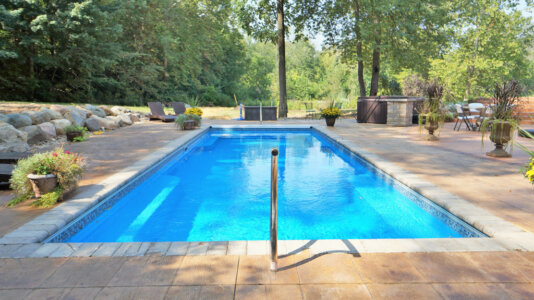
SPIRIT (13.5’ x 40’)
The Spirit from Thursday Pools offers something for everyone. The spacious and versatile pool features a fully integrated spa with a spillway, providing a luxurious relaxation space. It also includes a generous tanning ledge, an additional conversation area with entry steps and wraparound benches, and a flat-bottom swim lane, perfect for swimming laps or simply enjoying the water.
The Spirit and other larger designs 40 feet or longer are ideal for spacious or rural yards. In Texas, the average cost for a standard installation of these large fiberglass pool models is approximately $120,000.
Assessing Your Texas Property for Pool Installation
Texas’ varied landscape means that soil conditions can differ significantly from one property to another. For example, areas like Hill Country or West Texas may have rocky or caliche-rich soil, requiring specialized equipment and additional labor, increasing excavation costs. Areas with sandy soils, such as parts of South Texas, may need extra reinforcement to prevent the pool from shifting over time.
The natural slopes of your yard can also affect the installation process. Homes on hilly terrain may require additional grading or retaining walls to create a stable, level surface for the pool and surrounding deck. In more urban or suburban areas, where space is often more limited, accessibility can pose challenges. Narrow streets, tight driveways, or fenced-in lots may require crane rentals or special accommodations to deliver and install a one-piece fiberglass pool shell. Working with a local pool professional will help you navigate these unique challenges.
| AVERAGE ADDITIONAL YARD-RELATED EXPENSES IN TEXAS
|
|
| Excavating Sandy Soil | $3,700 |
| Excavating Clay Soil | $1,300 |
| Excavating Rocky Soil | $4,250 |
| Above-Average Slope Requiring Extra Grading | $6,200 |
| Limited Yard Access | $5,800 |
Understanding Pool Barrier Safety Regulations in Texas
When installing a fiberglass pool in Texas, it’s essential to understand the safety regulations and requirements for pool barriers. While the Texas Department of Health and Human Services doesn’t directly regulate private residential pools, homeowners must comply with the state’s building codes and local ordinances regarding pool enclosures.
Under Texas law, a barrier at least 48 inches high must enclose all residential pools. The bottom of the barrier should not exceed 2 inches above the ground to prevent small children or pets from slipping underneath.
In addition to state regulations, many Texas cities and counties have specific ordinances that may impose stricter rules. For example, in cities like Austin and San Antonio, pool gates must be self-closing and self-latching. The latch must be at least 54 inches above the ground and be on the pool-facing side of the gate for added security.
Since pool barrier requirements can differ from one municipality to another, consult with local professionals, city officials, and homeowners associations before beginning your installation.
For a 300-linear-foot fence, Texas homeowners can expect to pay an average of $8,950, according to estimates from our area dealers.
Enhance Your Fiberglass Pool with Popular Add-Ons in Texas
Upgrading your fiberglass pool with optional features and add-ons can transform your backyard into a paradise, offering a resort-style experience that suits your needs and preferences. While not essential, these enhancements can significantly improve convenience, aesthetics, and overall enjoyment for you and your family. Below, we’ve outlined some of the most sought-after upgrades by Texas homeowners and average pricing information based on our 2025 survey of Thursday Pools’ independent dealers across the state.
Pool Heating and Filtration Systems
Pool Heater Average Cost in Texas: $5,550
Keep your pool water comfortable, extending your swim season even as the evenings cool.
UV Filter System Average Cost in Texas: $4,400
Minimize chemical use and maintain crystal-clear water with a UV filtration system that eliminates bacteria and algae.
Automatic Pool Cleaning and Vacuuming System Average Cost in Texas: $5,150
Spend less time skimming and scrubbing with an automatic cleaning system that helps keep your pool clear and inviting.
Pool Automation and Smart Control System Average Cost in Texas: $6,200
Take control of your pool’s temperature, filtration, and lighting remotely from your smartphone or tablet, giving you convenience and control.
Pool Covers
Automatic Pool Cover Average Cost in Texas: $16,000
Improve pool safety, reduce water evaporation, and maintain a cleaner pool with an automatic cover that opens and closes with the push of a button.
Non-Automatic Safety Pool Cover Average Cost in Texas: $12,000
A more affordable safety cover option designed to keep debris out and provide peace of mind for pool owners.
Pool Decking and Landscaping
Poured-concrete patio (Approx. 1,200 sq. ft.) Average Cost in Texas: $11,650
A durable and cost-effective solution for poolside decking, concrete withstands Texas’ seasonal temperature shifts and provides a stable surface.
Paver Patio (Approx. 1,200 sq. ft.) Average Cost in Texas: $14,250
Create an elegant, slip-resistant deck with pavers, available in affordable concrete or premium natural stone like travertine. Brick and concrete pavers are ideal for Texas’ weather.
Surrounding Landscaping Average Cost in Texas: $5,000
Elevate the aesthetics of your pool area with decorative landscaping, including trees, shrubs, and vibrant flower beds.
Pool Features and Accents
Specialty Waterline Tile Average Cost in Texas: $9,300
Add a custom touch to your pool’s look with decorative tiles along the waterline, creating an upscale and polished appearance.
LED Pool Lights Average Cost in Texas: $1,819 per light
Enhance your pool’s ambiance at night with energy-efficient LED lights, available in white or multi-color options for dynamic effects.
Deck Jets Average Cost in Texas: $8,650 per jet
Add a dramatic flair to your pool with graceful arcs of water shooting from the deck into the pool.
Bubblers Average Cost in Texas: $1,100 per bubbler
Bubblers create small fountains in shallow pool areas, a playful and visually appealing addition that adds gentle water movement.
Cascading Waterfalls Average Cost in Texas: $6,600
Bring a spa-like ambiance to your pool with a natural-looking waterfall feature, offering a relaxing atmosphere.
Add-On Spa Average Cost in Texas: $16,000
Enhance your backyard oasis with an attached spa for a stunning spillover effect, providing a luxurious retreat alongside your pool.
Pool Slides and Diving Features
Simple Pool Slide Average Cost in Texas: $6,400
A classic, straightforward option brings some playful fun to your poolscape.
Deluxe Pool Slide Average Cost in Texas: $9,450
A taller, twistier slide goes above and beyond in adding excitement and flair.
Diving Board (Type 1 Diving Pools Only) Average Cost in Texas: $3,250
Diving boards are permitted only with certified Type 1 diving pools that meet the required slope and depth specifications. Use with caution and follow all safety guidelines.
*Thursday Pools strongly advises against pool slides and diving boards due to safety concerns. The inclusion of a diving board or slide with any fiberglass pool must be carefully reviewed by a licensed professional to ensure compliance with all local building codes, safety regulations, and manufacturer guidelines. Not all fiberglass pool models are suitable for diving or slide use. It is the responsibility of the homeowner and installer to ensure proper installation and usage. Always prioritize safety and consult a qualified expert before adding any diving or sliding feature to your pool.
Transform Your Texas Backyard with a Custom Fiberglass Pool
A fiberglass pool in Texas is more than just an investment—it’s an opportunity to create lasting memories, stay refreshed during the summer heat, and add long-term value to your home, whether you’re in the heart of the city or enjoying the peacefulness of rural Texas, choosing the right pool size, features, and installation plan is essential for making the most of your outdoor space.
Each pool installation is unique, so the best way to get an accurate estimate is by consulting with a local independent Thursday Pools dealer. They’ll evaluate your yard’s specific conditions, offer expert advice on excavation, access, and site prep, and guide you in selecting a pool design that aligns with your vision and budget.
Excited to get started? Use the Thursday Pools Pool Cost Calculator for pricing estimates, explore our Pool Selector Tool to find the perfect pool design, and book a consultation with a dealer near you. Your dream backyard is just a step away!
Get Your Personalized Estimate
How Much Does a Fiberglass Pool Cost in Alabama?
Sweet tea, southern hospitality, and long, sun-drenched summers—life in Alabama practically begs for a backyard pool. With warm weather stretching almost year-round, a swimming pool becomes more than just a luxury; it’s a way to make the most of outdoor living. If you’re exploring fiberglass pool cost in Alabama, it’s essential to understand how your soil conditions, property type, and design decisions can influence your investment. From red clay around Birmingham to sandy soil near Mobile Bay, site prep and excavation needs can shift dramatically. Whether you’re in one of Huntsville’s growing neighborhoods or a spacious rural lot outside Montgomery with near-limitless design flexibility, local factors play a significant role in planning your perfect pool.
Customization is key to creating a backyard retreat that fits your lifestyle, and personal touches can affect your overall pool budget. Features like tanning ledges, an integrated or add-on spa, and decorative decking with a premium outdoor living space can elevate the look and function of your pool but will also impact the final cost. Add in Alabama’s diverse local permitting requirements, safety regulations, and HOA restrictions, and the planning process becomes even more complex. Working with an experienced Alabama-based fiberglass pool installer ensures you stay on track and on budget for a pool that enhances your home and brings endless enjoyment.
What’s the Average Price of a Fiberglass Pool Installation in Alabama? Survey Says…
Thursday Pools collected key data through a 2025 survey of our trusted independent dealers throughout Alabama to help you understand the average cost of installing a fiberglass pool in the Yellowhammer State. If you’re beginning your research into fiberglass pool pricing in your area, this is a great place to start. We aim to give you a realistic idea of what to expect when budgeting for your backyard transformation.
AVERAGE ALABAMA FIBERGLASS POOL INSTALLATION BY SIZE |
|||
|---|---|---|---|
| Pool Type | Small Fiberglass Pools | Medium Fiberglass Pools | Large Fiberglass Pools |
| Size Range | Up to 26 ft Long or 400 ft² | 26 to 34 ft Long or 400 to 600 ft² | 35 ft and Longer or 600+ ft² |
| Average Cost | $60,000 | $80,000 | $90,000 |
Think of these numbers as a helpful jumping-off point, not the whole story. Alabama’s diverse landscapes mean everything from red clay soil to tight backyard access can affect your total pool cost. Add in your style and must-have features, and the price can shift. What is the best way to get a clear picture of what your fiberglass pool will cost? Talk with a local, trusted Thursday Pools dealer who knows the ins and outs of building pools in Alabama.
Average Prices for Popular Fiberglass Pools Installed in Alabama

PEARL (15’ x 25’)
The Pearl is popular for Alabama homeowners seeking luxury and space efficiency. At just under 16 feet in length, this compact fiberglass pool fits seamlessly into smaller yards, making it perfect for urban settings in cities like Birmingham, Huntsville, or Montgomery. A built-in tanning ledge and wraparound bench seating complement the elegant scalloped design, creating a stylish and functional space for relaxation and socializing.
Based on our 2025 survey of Thursday Pools dealers in Alabama, the average cost for a standard installation of the Pearl or similar fiberglass pool models less than 26 feet long and 400 square feet is around $60,000.

CATHEDRAL (14’ x 33’ 5’)
The Cathedral offers a versatile design with ample space for swimming and leisure with a touch of backyard elegance. Its gracefully curved ends provide visual appeal and maximize the swim area. The wide entry steps and built-in benches enhance accessibility and are ideal for relaxation and gatherings.
According to our dealer survey feedback, the average cost for a standard installation of the Cathedral or other medium-sized pool models between 26 and 34 feet or 400 to 600 square feet is approximately $80,000.
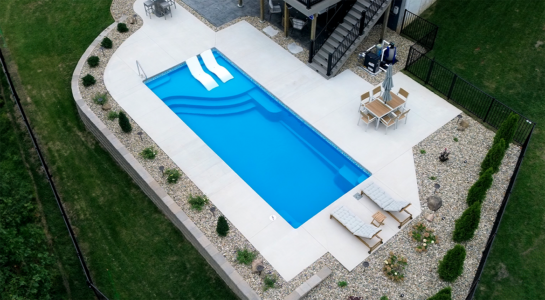
ASPEN (16’ x 40’)
The Aspen offers an expansive fiberglass pool design for expansive properties seeking style and functionality. Measuring 16 feet by 40 feet, the Aspen is ideal for homeowners who want a spacious area for swimming, hosting parties, or simply relaxing in luxury. Featuring a large tanning ledge, full-length steps, and deep-end swim-outs with benches, the Aspen offers comfort and accessibility for everyone.
The Aspen and other pools 40 feet or longer are well-suited for expansive or rural properties. The average cost for a standard installation of these larger fiberglass pool models in Alabama is $90,000.
Evaluating Your Alabama Property for Pool Installation
Alabama’s diverse terrain presents unique challenges when it comes to pool installation. For example, regions like the Appalachian foothills or parts of North Alabama often feature rocky or clay-heavy soil, which may require specialized equipment for excavation and additional labor, driving up costs. Areas with softer, sandy soils, such as along the Gulf Coast, may require extra precautions to prevent shifting or settling of the pool over time.
The layout of your yard plays a key role in the pool installation process. If your property has uneven or sloped land, like many areas in the foothills of the Appalachians or parts of rural Alabama, it may require additional grading or retaining walls to create a solid foundation for your pool and deck. Access can sometimes be challenging in more urban or compact suburban settings, such as in Birmingham or Montgomery. Tight driveways, narrow streets, or fenced-in yards may require renting a crane or other specialized equipment to get the pool shell into place. Working with a local pool expert will help you navigate these challenges and ensure the installation goes smoothly, no matter what your property looks like.
| AVERAGE ADDITIONAL YARD-RELATED EXPENSES IN ALABAMA
|
|
| Excavating Sandy Soil | $600 |
| Excavating Clay Soil | $600 |
| Excavating Rocky Soil | $7,000 |
| Above-Average Slope Requiring Extra Grading | $8,000 |
| Limited Yard Access | $8,000 |
Navigating Pool Barrier Safety Regulations in Alabama
While Alabama does not have a single statewide law governing residential pool enclosures, many cities and counties enforce their own safety regulations to help prevent accidents and unauthorized access. In general, most local ordinances require that a barrier enclose in-ground and above-ground pools—often a fence at least four feet in height—with a self-closing, self-latching gate. These barriers are designed to restrict access, especially for young children, and must meet specific requirements regarding gaps, gate placement, and durability.
Requirements may vary significantly depending on where you live. For example, some municipalities may require taller fences, special locks, or specific distances between the pool and property lines. The Alabama administrative code also requires surrounding residential pools with a secure fence and locking gate to prevent unsupervised access.
Because regulations differ across counties and cities in Alabama, you must check with your local building department or homeowners association before installing a pool. A qualified pool professional familiar with your area can help you navigate the permitting process and ensure your pool meets all local safety standards.
For a 300-linear-foot fence, Alabama homeowners can expect to pay an average of between $7,500 and $10,000, according to estimates from our area dealers.
Customize Your Alabama Fiberglass Pool with Popular Add-Ons
Upgrading your fiberglass pool with popular add-ons can take your Alabama backyard to the next level, creating a personalized retreat that fits your lifestyle and adds extra comfort and style. While not required, these enhancements can elevate your pool experience—whether through added functionality, visual appeal, or relaxation features the whole family can enjoy. Below, we’ve highlighted some of the most in-demand upgrades among Alabama homeowners and average pricing insights from our 2025 survey of Thursday Pools’ independent dealers across the state.
Pool Heating and Maintenance Systems
Pool Heater Average Cost in Alabama: $5,550
Keep your pool water at the perfect temperature year-round, even as Alabama nights get colder, and extend your swimming season.
UV Filtration System Average Cost in Alabama: $3,500
Reduce the need for harsh chemicals and enjoy sparkling, clear water with a UV filtration system that effectively neutralizes bacteria and algae.
Automatic Pool Cleaner and Vacuum System Average Cost in Alabama: $700
Save time and effort with an automatic cleaning system that keeps your pool pristine and ready for a swim with minimal maintenance.
Pool Automation and Smart Control System Average Cost in Alabama: $5,500
Enjoy ultimate convenience by controlling your pool’s temperature, filtration, and lighting from your smartphone or tablet, offering easy access to pool management from anywhere.
Pool Cover Options
Automatic Pool Cover Average Cost in Alabama: $15,000
Enhance safety and convenience with an automatic pool cover that operates at the touch of a button. It helps minimize water evaporation, removes debris, and adds extra protection, especially for families with kids or pets.
Manual Safety Pool Cover Average Cost in Alabama: $6,500
A cost-effective solution for maintaining a clean and secure pool. This durable cover helps prevent unwanted access while keeping leaves, dirt, and other debris out of the water.
Pool Decking & Landscaping in Alabama
Concrete Patio (Approx. 1,200 sq. ft.) Average Cost in Alabama: $11,400
A sturdy, cost-effective choice that handles Alabama’s climate well and provides a clean, reliable poolside surface.
Paver Patio (Approx. 1,200 sq. ft.) Average Cost in Alabama: $3,500
Pavers offer a stylish, slip-resistant finish with options like concrete, brick, or natural stone—perfect for customizing your backyard look.
Landscaping Average Cost in Alabama: $10,000
Enhance your pool area with simple landscaping touches like shrubs, flowers, or decorative borders to boost curb appeal.
Standout Features & Stylish Accents
Specialty Waterline Tile Average Cost in Alabama: $4,500
Give your pool a custom, high-end finish with decorative waterline tile. This eye-catching detail adds color, texture, and a polished look that elevates your entire poolscape.
LED Pool Lights Average Cost in Alabama: $750 per light
Set the mood after sunset with LED pool lights. Choose from crisp white or vibrant color-changing options to create the perfect evening atmosphere, all while keeping energy costs low.
Deck Jets Average Cost in Alabama: $700 per jet
Add a dynamic visual element with deck jets that send graceful streams of water arching into the pool.
Bubblers Average Cost in Alabama: $800 per bubbler
For tanning ledges or shallow areas, bubblers produce gentle, bubbling water effects that are playful and soothing, adding life and motion to your pool.
Cascading Waterfalls Average Cost in Alabama: $3,500
Bring the calming sounds of nature to your backyard with a built-in waterfall feature. Add a spa-like ambiance and enhance the overall aesthetic of your pool.
Add-On Spa Average Cost in Alabama: $16,000
Take your relaxation to the next level with an attached spa. Whether for hydrotherapy or a peaceful retreat, a spa addition offers a stunning spillover effect into the main pool.
Pool Slides and Diving Features
Simple Pool Slide Average Cost in Alabama: $6,500
Bring a playful element to your pool with a traditional slide—simple, fun, and great for family enjoyment.
Deluxe Pool Slide Average Cost in Alabama: $8,500
For a more adventurous experience, a deluxe slide offers extra height and curves for added excitement.
Diving Board (Type 1 Diving Pools Only) Average Cost in Alabama: $1,800
Diving boards are only permitted for certified Type 1 diving pools that meet specific depth and slope standards. Proper planning and installation are essential for safe use.
*Thursday Pools strongly discourages slides and diving boards due to safety concerns. Not all fiberglass pool models are designed to support these features. If you’re considering adding one, it’s crucial to consult a licensed professional to ensure compliance with local codes, safety regulations, and manufacturer specifications. Homeowners and installers share responsibility for safe installation and use. Always prioritize safety and expert guidance before adding diving or sliding elements to your pool.
Bring Your Alabama Backyard to Life with a Custom Fiberglass Pool
A fiberglass pool in Alabama is more than just a backyard upgrade—it’s a gateway to year-round relaxation, outdoor entertaining, and cherished time with family and friends. Whether enjoying quiet rural living or soaking up the energy of a city like Birmingham, Huntsville, or Mobile, the right pool can elevate your space and add lasting value to your home.
Every backyard in Alabama has its own personality, so working with a trusted local Thursday Pools dealer is the key to getting the most accurate estimate and best-fit design. From evaluating your yard’s layout and soil conditions to recommending the ideal features and finishes, your dealer will help you plan a pool that perfectly fits your vision and lifestyle.
Ready to get started? Try the Thursday Pools Pool Cost Calculator to explore pricing, use the Pool Selector Tool to find your ideal model, and connect with a dealer near you to start planning your perfect Alabama pool retreat today.
Get Your Personalized Estimate
How Much Do Add-On Features Add to Pool Cost?
When you’re looking into an inground fiberglass pool, pool cost is often one of the first considerations. While resources like pool cost calculators can provide base package pricing, they might not account for add-on features—both essential and non-essential—that can significantly impact your budget. Think of heaters, lighting, tiling, covers, and more. If your dream pool includes all the bells and whistles, this guide will help you understand how much these features might cost so you can plan and budget wisely.
LED Pool Lighting
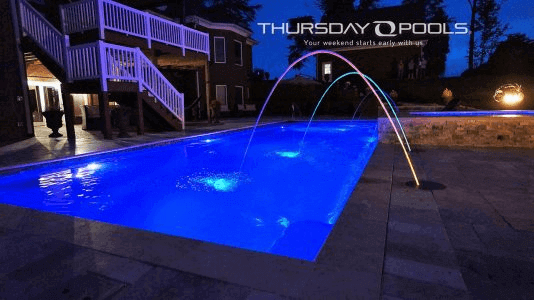
LED lights don’t just brighten your pool; they transform it into a stunning nighttime retreat. They provide ambiance and visibility, extending the usability of your pool well into the evening. To achieve the desired effect, you’ll need to calculate the lumens required based on your pool’s size and surface color. You’ll need a minimum of eight lumens per square foot of pool water surface area (which is roughly equivalent to one watt per square foot.) Depending on your pool’s size and the light output (or lumens,) you may need multiple LED pool lights to get the effect you’re after. Keep in mind that the pool surface color can also impact light visibility. The darker the pool surface color, the more the light will be absorbed.
Estimated Addition to Pool Cost: $1,500–$3,500.
Pool Tile
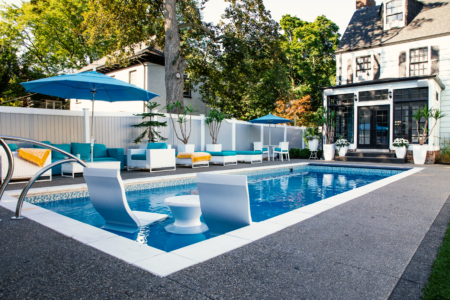
Perimeter tile (also called waterline tile) and inlaid pool tile can dramatically impact the look and feel of a swimming pool. Tile can also designate steps, depths, and ledges to enhance swimmers’ safety. Pool tiles are typically available in ceramic, porcelain, or glass and come in multiple sizes, patterns, and designs. All of these options will impact the cost of your pool tile. The price varies based on material and customization.
Estimated Addition to Pool Cost: $4,500–$8,500 for waterline tile. Custom inlaid tiles and mosaics can cost significantly more. You’ll need to get an estimate from a pool builder for these tile types.
Water Features
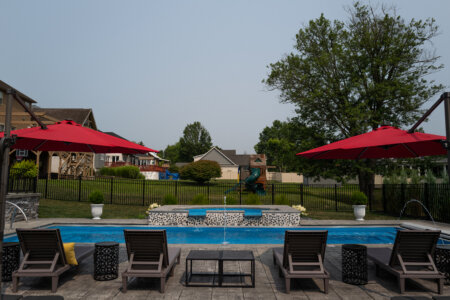
From simple additions like deck jets and bubblers to extravagant custom waterfalls, water features can elevate your pool’s look and feel. They’re perfect for adding a touch of fun or a resort-like vibe to your backyard. Deck jets and bubblers are simple water features that add ambiance for less. Higher-end water features like cascades and custom rock waterfalls cost more and offer a luxury experience.
Estimated Addition to Pool Cost: Bubblers range from $1,000 to $2,500 each, while deck jets range from $1,000 to $1,500. Certain cascade/waterfall features can add anywhere from $1,300 to $25,000 to your pool cost.
Pool Heaters (and Chillers!)
Control your pool’s temperature for year-round enjoyment. Pool heaters extend your pool swimming season and allow you to enjoy a quick dip even when temperatures start to fall. Some heat pumps even offer a chiller option whether you live in a warmer climate or just want to keep your pool water cool and refreshing in the hottest part of the summer.
Estimated Addition to Pool Cost: Natural gas or propane heaters cost, on average, between $1,500 to $2,500. Electric pool heaters or heat pumps typically cost about twice as much as natural gas or propane pool heaters; they’ll run between $2,000 -$5,000. The chiller option adds about $1,500-$3,500 to the cost of a standard heat pump.
Pool Covers
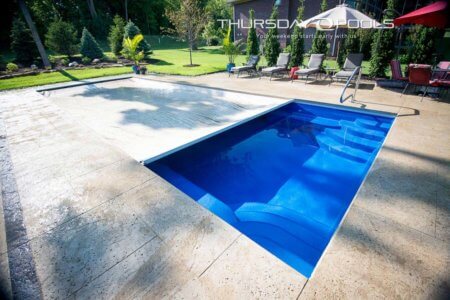
Most pool owners in regions where the seasons change choose to purchase some type of pool cover. Options range from basic winter covers to top-of-the-line automatic safety covers. Automatic pool covers provide the security of a safety cover with the additional bonus of automatically opening or closing the pool cover more quickly with the touch of a button. They can also save you money by keeping heat in and debris out, reducing your heating bills and chemical costs. Because they run on a track system, automatic covers are best suited for rectangular-shaped pools, while other pool cover types fit a variety of shapes.
Estimated Addition to Pool Cost: Basic winter covers will cost between $50 and $350, depending on the pool size and material quality. Safety covers are custom-made and cost between $1,700 and $5,000 (considerably more if your pool is multi-tiered.) Installation is an additional cost. Automatic safety covers can range between $12,000 and $17,000 depending on the size of your pool and the mounting style you choose.
Slides
Pool slide options have come a long way in the last decade. Once simple designs now incorporate more complex shapes and water features. If a slide is on your must-have list, be sure to look into safety precautions. Please note: Thursday Pools strongly recommends that slides not be installed or used with its pools, given the inherent dangers associated with slides in residential pools.
Estimated Addition to Pool Cost: Traditional pool slides cost between $4,500 and $6,000. More feature-rich pool slides range from $8,000 to $12,000.
Automatic Pool Cleaners
It’s important to keep your pool clean. Save time and energy with robotic pool cleaners that can handle cleaning so you can focus on enjoying your pool. There are dozens of automatic pool cleaners on the market, and the choices can be overwhelming. Be sure to consult with your pool builder about which brands or types they recommend for your pool, and do your research to see which ones have the functions that meet your needs.
Estimated Addition to Pool Cost: Most automatic pool cleaners range from $1,500 to $3,000. Many of them will also come with optional storage and transportation carts at an additional cost.
Is Owning a Pool Expensive?
Owning an inground swimming pool has definite benefits but isn’t a small purchase. A pool is often one of the larger purchases a homeowner can make when upgrading their outdoor living space.
Consider the upfront costs associated with having the pool installed and the lifetime costs of maintaining the pool. The upfront pool cost will be exactly that – more money you’ll have to pay in one short amount of time. However, maintenance costs must also be considered and will vary based on pool type.
And remember, many of the add-ons we discussed here don’t necessarily have to be included in the initial installation of the pool and may be added on later, so if you think you might like to have these features down the road, be sure to factor those into your overall pool budget. If you’re looking to get some ballpark figures for a fiberglass pool (including many of the add-ons mentioned above), check out our fiberglass inground pool cost estimator. Book a design consultation today if you’d like to have a more direct discussion with a pool builder near you!
The Hidden Costs of Installing an Inground Pool
Installing an inground pool can transform your backyard into a personal oasis, offering a perfect relaxation, exercise, and entertainment spot. While upfront inground pool costs might seem manageable, there are numerous hidden costs that potential pool owners must consider. Understanding these hidden expenses for inground pools will help you make an informed decision and avoid unexpected financial burdens.
Initial Installation Costs
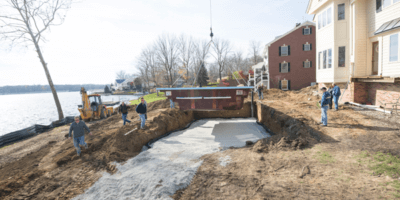
The initial installation is the most apparent cost. The process of installing an inground pool includes excavation, pool shell, plumbing, electrical work, and landscaping. The price varies significantly based on the pool type (concrete, vinyl, or fiberglass), size, and additional features like waterfalls or lighting. The installation can range from $25,000 to $120,000 on average, but this is just the beginning. Typically, vinyl inground pools are the cheapest way to build an inground pool when it comes to upfront installation costs. Fiberglass would follow next, and then concrete is typically the most expensive. It’s also important to note that these cost estimations are assuming the pool is installed by a professional pool builder. DIY inground pool costs may be less upfront, but if done incorrectly, it could cost you much more down the line to correct mistakes.
Excavation and Site Preparation: Before the pool installation, the builder must prepare the site. Site preparation involves excavation, which can be more complicated and expensive depending on your soil type, the presence of rocks, or any necessary grading. Unexpected obstacles during excavation can add a significant amount to the cost. Additionally, permits and inspections required by local authorities also add to the initial expenses.
Pool Shell and Materials: The choice of materials for your pool shell—concrete, vinyl, or fiberglass—impacts the overall cost. Each material has pros and cons, with concrete being the most durable, customizable, and expensive. Vinyl liners are the cheaper option in upfront expenses, but liners need replacement every 5-10 years on average. Fiberglass is a mid-range option in terms of cost and durability.
Maintenance Costs
Regardless of what material your pool is made of, regular maintenance is essential to keep it in good condition. Maintenance costs include chemical balancing, cleaning, equipment upkeep, and potential repairs. Required maintenance will also depend on your pool’s material. For example, concrete pools often require acid washing and replastering after a specific time, adding to your lifetime upkeep expenses.
Water Balance Treatments: Maintaining the correct chemical balance in your pool is essential for health and safety. The cost of chemicals such as chlorine, pH balancers, and algaecides can add up over time. Pool owners should expect to spend several hundred dollars annually on chemicals. Follow the recommended water chemistry levels per your pool’s manufacturer.
Cleaning and Repairs: Regular cleaning is necessary to keep your pool free of debris and algae. Whether you do it yourself or hire a pool service, maintaining an inground pool involves ongoing costs. Pool equipment such as pumps, filters, and vacuums also require maintenance and eventual replacement. Additionally, unexpected repairs due to equipment failure or structural issues can be costly.
Utility Costs: Pools consume a significant amount of water and electricity. Filling a pool the first time requires a large volume of water, and ongoing evaporation means you must top it off regularly. Refilling can be expensive, whether due to evaporation, leaks, or kids splashing. Water can be a significant cost, particularly in areas with high water prices or restrictions on water usage. The cost of running pool pumps, heaters, and lighting can significantly increase your utility bills, especially if you run them frequently. Pool heaters alone, particularly gas or electric models, consume a lot of energy. Efficient equipment and smart usage can help manage these costs, but they remain a substantial part of pool ownership. Electric use will likely cost you hundreds of dollars annually.
Winterization: In colder climates, pools require winterization to protect them from freezing temperatures. This process may involve draining the pool partially, adding antifreeze to the plumbing, and covering the pool securely. Please note: a fiberglass pool’s water level is NOT to be lowered for winterization, which could cause potential structural damage. Winterization and reopening in the spring come with labor and materials costs.
Insurance and Liability: Homeowners should consider the impact of an inground pool on their home insurance. Pools are often regarded as attractive nuisances and can increase liability risks. As a result, insurance premiums can rise significantly. Adding safety features such as fencing and pool alarms can mitigate some of these costs but are also an additional ongoing expense.
Other Considerations
Long-term Resale Value: While a pool can enhance your enjoyment of your home, its impact on resale value is mixed. In some markets, a pool can increase the appeal and value of a home, while in others, it can be a deterrent due to the associated maintenance costs and liability concerns. Potential homebuyers may also be wary of the hidden costs of owning a pool.
Legal and Regulatory Considerations: Local regulations may require specific safety measures such as fencing, alarms, or particular cover types. Ensuring compliance with these regulations may involve additional costs for installation and potential modifications. Be sure to discuss the local requirements for your pool with the pool builder who is installing it.
The Bottom Line of Inground Pool Costs
Inground pool installation comes with many costs you may not initially think about. Understanding these hidden costs allows you to make a more informed decision and enjoy your pool without unexpected expenses. When considering the lifetime ownership of a pool, a fiberglass pool is an excellent long-term investment. Try our fiberglass inground pool cost calculator for a ballpark estimate on a Thursday Pools fiberglass pool. If you are ready to get a detailed estimate, book a design consultation with an independent dealer in your area.
